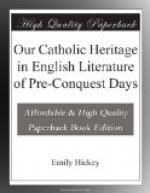A sorrowful story of evil folly and treachery: a splendid story of steadfastness to the end: of glorious martyrdom. The refusal to allow himself to be ransomed at his pillaged people’s cost; the greed of the Danes; the death-stroke given him, we are told, in another chronicle, in mercy, to put an end to his sufferings, given him by a newly-made convert of his. And see how the Church has shown us, in her canonisation as a martyr saint, of this man, who died not directly to testify to the truth of the religion of Jesus, but for the sake of justice, that justice is the outcome of Christianity, and that he who dies for justice sake dies for God.
It was said by Lanfrane that AEfeah was not a martyr, because he had not died for the Faith; but St Anselm said he was a true martyr, because he died for justice and charity.
CHAPTER XII
Abbot AElfric, writer of Homilies, Lives of Saints, and other works. Wulfstan, Archbishop of Canterbury.
The greatest of English prose-writers before the Conquest was AElfric, who was educated at the school at Winchester which AEthelwold, a pupil of St Dunstan, had founded. His works are very numerous. He wrote Homilies, or Sermons, on Scriptural subjects, and Lives of the Saints. I have quoted a passage about “Judith,” which occurs in the summary of the books of the Old Testament, written for a friend of his, one Sigeweard, who had often asked him for English writings, which he had delayed giving him until after he had, at Sigeweard’s earnest request, come to his house, and then Sigeweard had complained to him that he could not get at his writings. This little incident reminds us how differently from now people had to arrange about books and writings, and how much more dependent they were on teaching through the ear and the eye.
I must give you a little specimen of AElfric’s writing, a piece taken from his beautiful homily on Holy Innocents’ Day. It is in very simple, direct language, and I think you will say it is not without a touch of that lovely thing which it is easy to feel and hard to define—poetry. I should like to have heard the sermon, and I hope you will feel somewhat as I do!
“Christ despised not His young soldiers, although he was not present in body at their slaughter. Blessed were they born that they might for His sake suffer death. Happy is that their (tender) age, which was not yet able to confess Christ, and was allowed to suffer for Christ. They were the Saviour’s witnesses, although as yet they knew Him not. They were not ripe for the slaughter, but yet did they blessedly die to live! Blessed was their birth, for they found eternal life on the threshold of this present life. They were snatched from mother-breasts, but they were straightway given into the keeping of angel-bosoms. The cruel persecutor (Herod) could with no service benefit those little ones so greatly as he benefited them with the hatred




